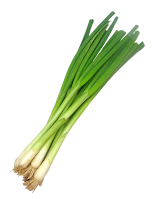| Cinnamon sticks maxpixel.freegreatpicture.com |
In traditional Chinese medical theory, when one gets sick with colds or flu it is thought that an external pathogen has invaded the system. Western medicine similarly holds that colds and flu are caused by bacteria or viruses. Each of the five tastes (sweet, salty, bitter, sour and pungent) has a specific action. The pungent taste has the action of pushing outward and dispersing unwanted "invaders" through the skin, as evidenced by sweating.
When coming down with a cold or flu the herb to take is actually a food: scallions. Known as the Chinese herb cong bai, scallions release the pathogen by inducing sweating. Simmer scallion or other onion along with garlic and ginger and drink the broth to keep a cold or flu from going deeper.
 |
| scallions |
If a cold or flu has gone deeper and has affected the muscles, the herb of choice is cinnamon, known in Chinese as gui zhi. Cinnamon is warming and can help when the person is feeling weak especially if sweating does not help them feel better. In this case, cinnamon will warm, strengthen and increase immunity.
cinnamon
Fresh ginger (sheng jiang) is also warm and releases the pathogen. Ginger is especially good if the person feels cold and is coughing. Similar to cinnamon, ginger strengthens the immunity for weaker people who are sweating without relief of symptoms.
 |
| ginger |
A nice tea when feeling chilled and recovering from a cold or flu, is made by simmering a couple of cinnamon sticks and sliced fresh ginger in water for at least 20 minutes, strain and drink as needed.
If there are heat symptoms such as a sore throat or fever, switching to a cooler herb which still releases the pathogen is appropriate. One such herb is mint, or bo he. Flowers such as chrysanthemum (ye ju hua), honeysuckle (jin yin hua), and dandelion (pu gong ying) mix well with mint to cool the body and release the pathogen.
One important note: herbs such as ginseng, astragalus and bee pollen also strengthen the immune system, but these herbs have a sweet taste and will actually strengthen pathogens. They are wonderful to take as prevention, but if you end up coming down with a cold or flu, stop taking them and switch to one of the above remedies. Once the illness has passed completely, it is safe to take the sweet strengthening herbs again.
And of course acupuncture is always helpful to boost your immune system to prevent and/or recover from cold or flu.
Food is the best medicine! Eat well, drink lots of water, and incorporate these wonderful spicy tasting foods, herbs, and spices into your life!
Be well!
Melissa and David Sokulski, licensed acupuncturists
a version of this article first appeared in Natural News.


